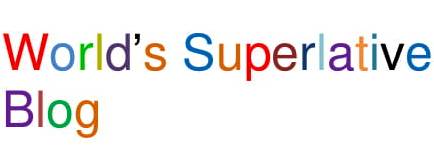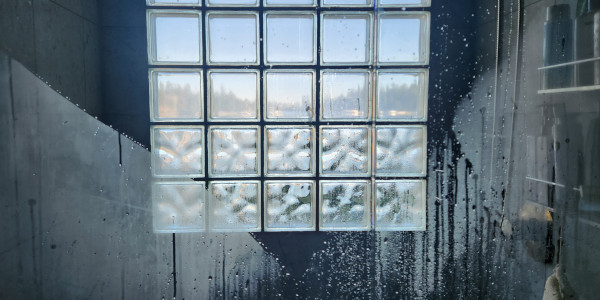We do it anyway
After my morning shower I grab the squeegee and carefully scrape down all the surfaces. The theory is that this will lead to less water spotting and perhaps prevent mold growth. But as I scraped away the other day (an activity I find quite burdensome) I wondered if I was actually doing anything useful. On rare occasions when I don’t squeegee, say because I’m running late for a ferry, I have to admit I don’t notice any water spots the next day. And since we have a good vent fan, the shower room seems to dry out pretty quickly. Do I really need to worry about either mold or water spots?
And speaking of showers, is it really necessary to take one every day, as I’ve done for many years? I recently read a commentary by a dermatologist who said that daily showering is quite unnecessary, and in fact is probably a bad idea since it tends to dry out the skin. And besides, it wastes water. And I recall a provocative commentary by another physician who said that he never takes a shower unless he’s visibly dirty. Yikes! He claims that he remains in excellent health, has supple skin and non-greasy hair, and doesn’t broadcast any unpleasant odors, at least according to his wife.
Despite the lack of evidence that daily showers with post-shower squeegeeing are appropriate, I continue with this ingrained routine. Perhaps for no better reason than that I enjoy showering (though not squeegeeing). I certainly can’t defend my behavior on any rational grounds. But I do it anyway.
Now that I’ve admitted my culpability in behaving irrationally, I feel I’ve immunized myself against being accused of being judgmental when I cite examples of things other people do without good reason. I might start by mentioning folks who are grimly determined to drink at least eight glasses of water a day. This, despite that apart from unusual circumstances (for example, hard exercise when it’s very hot outside) there’s absolutely no evidence that drinking fluid, other than when you’re thirsty, is of any benefit. In fact, there are several studies that suggest that drinking extra water is actually not wise. Some water guzzlers believe that inducing more frequent urination is useful since it “flushes toxins” out of the system. Such people should know that it’s well-established that peeing more does not eliminate more toxins. It just dilutes the same amount of toxins that the kidney excretes regardless of fluid intake. But will I tell all this to people I see schlepping around those huge Nalgene water bottles wherever they go? Of course not. That would have about as much effect as someone suggesting that I change my unnecessary and wasteful showering behavior. They’ll do it anyway.
On the other extreme, there are people who refrain from drinking any liquids at all during a meal because of their belief that doing so will “dilute the enzymes” in their stomach, impairing the digestion of their food. I won’t go into all the reasons why this is simply not true but will just say that it’s a quite unnecessary restriction. As opposed to glugging eight glasses of water throughout the day, drinking some liquids during a meal can be pleasurable, helps the food go down, quenches thirst, and, if anything, is likely to enhance digestion. But would I ever try to convince believers that they are needlessly limiting themselves by foregoing liquid while they eat? Of course not. They’ll do it anyway.
Then there’s gluten. Only one or at most two percent of people actually have “gluten-sensitive enteropathy,” as we in the GI biz call it, or as it’s better known, “celiac disease.” But a far higher proportion believe they have adverse reactions to gluten (“non-celiac gluten sensitivity”). Symptoms include not only abdominal pain and nausea but diarrhea (for some), constipation (for others), brain fog, headaches, anxiety, depression, fatigue, joint pain, and rashes, to name a few. As opposed to celiac disease, there are no blood or tissue tests to confirm the presence of non-celiac gluten sensitivity. It’s a do-it-yourself diagnosis depending simply on the person’s belief that they’re sensitive to gluten. I won’t go into all the reasons why non-celiacs who say they are sensitive to gluten are very likely actually not. I’d just point out that people who claim gluten sensitivity generally experience symptoms only when they know that they’ve eaten the stuff. In “blinded food challenge studies,” subjects are randomly given either regular bread, or similar-appearing bread made without gluten. Almost without exception, people who are certain they are sensitive to gluten can’t distinguish which version of bread they’ve eaten based on subsequent symptoms. Despite all the evidence, I’d never suggest to a person who eschews gluten to give it a try. They’ll continue to avoid it anyway.
Continuing on the food theme, we make rice two or three times each week in our beloved Zojirushi rice steamer. It makes great rice. Along with other fans, we affectionately refer to our appliance as “The Zoji.” When we first got it I watched a Zoji video about how to prepare rice for cooking. After putting a carefully measured portion rice in the special pot, you are to quickly rinse and drain it three times. Then stir the rice vigorously with your clawed fingers (ten circuits clockwise, then counterclockwise, then again ten clockwise), then rinse it, and repeat this finger stirring a total of three times. But you’re still not done—this sequence is followed by three more non-stirred rinses. The idea, say the Zoji mavens, is to wash out as much of the husk fragments as possible, which enhances the quality of the cooked rice. So even though it’s tedious, I’ve followed this recipe for years. Occasionally I’ve heretically wondered whether such a carry on is really necessary. Indeed, when my wife makes rice she’s much less compulsive than I am, just giving it a quick rinse once or twice, then chucking it into the Zoji. And I have to admit, her rice doesn’t seem at all inferior to the rice I so carefully prepare. But does this alter my rinsing behavior? Alas, no. If the Zoji pros tell me how I should wash rice, how can I defy them? I do it anyway.
So there’s copious evidence that I and many—probably most—of my fellow humans do things that are unnecessary, irrational, or both. I wonder how much time we waste over the course of our lives, and how much aggravation we self-inflict, by adhering to such needless routines. But alas, the combination of belief and habit is very potent–they work in concert to sustain behaviors, no matter how irrational. Moreover, I do appreciate that there’s a place for rituals in our lives. They help stitch the day together, and can give order and comfort. But if they aren’t altogether pleasant, and if they involve unwelcome time and effort, there’s reason to examine them and see if they’re really worth continuing.
The good news is that occasionally such behaviors are actually changeable. Here’s one tiny example: for years before starting a fire in our wood stove, I opened a window. The theory was that doing so increased ventilation into the stove, making the fire start more readily. But a few months ago, in my haste to warm up the house on a particularly cold morning, I forgot to open a window. Nonetheless, the fire started just fine; in short order the house was warm and toasty. So guess what? Now I never open a window before firing up the stove. This is not only a little time saver, but it means I don’t have to remember to close the window once the fire is blazing, which I often forgot to do, letting lots of precious warm air escape.
Eliminating behavior that’s irrational, or simply unnecessary, can save time, and sometimes really improve the quality of life. Maybe we should all examine some of the things we do that are bothersome or time consuming, and consider whether there’s really good reason for us to persist. And then make a change and see what happens: Dare to eat a slice of toast. Leave that Nalgene home. Drink a nice glass of water with dinner. Speaking for myself, I’m not yet ready to stop showering daily, but maybe I’ll try cutting down the squeegee use to every other day. And even rinse the rice a bit less assiduously. No telling what I’ll do with all the extra time.




Enjoyable, humourous and a bit Mark Twainish!! We love the way you look at everyday things or activities
OK now I have to figure out what I do every day and needn’t.
Ken, Your essay got me to think about the “three meals a day” routine. Is three meals/day a divine edict or the result of groupthink, perhaps encouraged by the food or restaurant industry? I’ll be reflecting on my own rituals after having read your blog. Cheers! Carl
Great essay that is making me reflect on my compulsions and habits. When I was working, I jumped in the non-glass squeegeeless shower and was out the door in half an hour every work day. Now retired with a glass squeegeed shower, I only shower when I need to, which is admittedly sometimes hard to determine. Why the change? A change in circumstances that helped change my behaviour. But now to a bigger one: I check my emails regularly, way too often, and feel the need to deal with them right away. Not rational, nothing is really urgent, but it’s comforting. Case in point, I got the email about your blog and immediately started reading. I have been advised that when I notice myself acting on one of these habits or compulsions, I should take a deep breath before proceeding and decide, rationally and emotionally, what to do, eg read the emails or sit with my coffee or wine and look out the window. It helps. So when confronted by the email about your blog, I thoughtfully decided to open and read it since I thoroughly enjoy them. Thanks again.
Another piece of very creative and witty writing! It reminded me somewhat of Mark Twain’s work and reflections but in a modern sense!
Nice one, Ken. It’s so easy to continue doing repetitious and unnecessary things that somehow comfort us. Now excuse me while I go and squeegee my shower…
Nice one, Ken. It’s so easy to continue doing repetitious and unnecessary things that somehow comfort us. Now excuse me while I go and squeegee my shower…
Fun to join you in your daily activities and the deep thoughts that go into your decisions about rice washing or shower squeegeeing! And I’m amazed to hear that gluten remains an issue in the U.S. of A.
I’m one of those compulsive water drinkers (though it has more to do with legitimate thirst than rule-following). So, I’ll happily lug the Nalgene and consume all the H2O you eschew! 😉
This is good food for thought, in terms of unnecessary habits. I certainly have some; just need to figure out what they are!
Another good thought-provoking blog, Ken! I would never have imagined you doing something that doesn’t necessarily have rational support, but you gave some great examples 🙂 My recent quest has been to do things more efficiently to save time and energy, but perhaps I need to review instead what to “let go.” Now I feel compelled to escalate my review before I forget–or add on another routine!